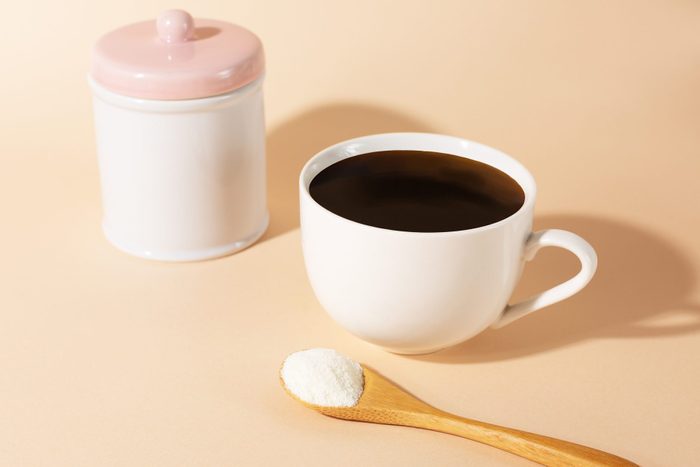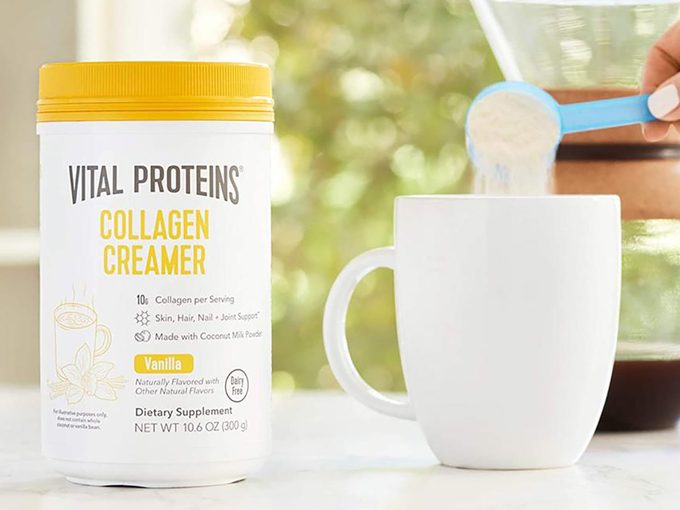What Is Protein Coffee—and Should You Try It?

Protein coffee—basically protein powder in coffee—is touted for potential weight loss benefits, but is it healthy? Here's what dietitians want you to know.
Last year, whipped coffee was all the rage. This year? Protein coffee has everyone’s attention. In the event you’re not up on the current TikTok lingo, protein coffee is simply protein powder added to coffee.
It’s hard to pinpoint the exact moment protein coffee became the next “it” beverage, but many say that TikToker @happyhealthyolivia’s video showing her frothing a Premier Protein beverage and adding it to her hot coffee made protein coffee—aka a proffee—huge.
Since then, other coffee companies have jumped on the bandwagon, including Bulletproof—you know, the company that years ago made the combo of butter and coffee so popular—whose suggested recipe for protein coffee includes a combo of coffee, collagen protein, prebiotic powder, and MCT oil.
But just how healthy is this trend, and is there a best way to brew and drink it? We talked to a registered dietitian to find out.
(Related: Does Vegan Collagen Powder Really Work?)
What is protein coffee?
You can make protein coffee one of two ways. “It’s the combination of your choice of coffee mixed with either a premixed protein drink or a protein powder,” says Emma Backes, a registered dietitian in St. Cloud, Minnesota. While there’s no actual consensus among experts on how much protein you should pour into your java, Backes suggests adding 10 to 20 grams of protein. “That would be roughly half to one bottle of premixed drink, or about one scoop of protein powder,” she notes. For comparison, two eggs provide 12 grams of protein, while three ounces of salmon contains 17 grams of protein.
When to drink protein coffee
Some people don’t love breakfast. Others simply can’t (or won’t) make time in the morning for a meal. So if your go-to is just a cup of coffee in the morning, adding protein to your mug can be a good way to fuel your day and to help tide you over till the next meal.
Another way protein coffee can be used? Bridget Wood, a registered dietitian nutritionist in Reno, Nevada, suggests looking at it as a post-workout beverage. Protein after a hard workout helps promote muscle repair and growth.
(Related: The Best Supplements for Brain Health)
Protein coffee nutrition
There are so many protein powders and protein drink options out there that you can add to your coffee. The nutrition in your protein coffee will differ, depending on the version you use and how much protein it contains. How you make your coffee—and, in particular, what add-ons you include—will also play a role in your morning brew’s overall nutrition.
Here’s a look at the nutritional profile of protein coffee made with eight ounces of brewed coffee and 20 grams of unflavored collagen peptides.
- Calories: 70
- Total fat: 0 g (0 percent of the recommended daily value, or DV)
- Saturated fat: 0 g (0 percent DV)
- Cholesterol: 0 mg (0 percent DV)
- Sodium: 70 mg (3 percent DV)
- Carbohydrates: 0 g (0 percent DV)
- Fibre: 0 g (0 percent DV)
- Protein: 18 g
- Calcium: 45 mg (4 percent DV)
- Potassium: 113 mg (2 percent DV)
(Related: Some Pretty Unexpected Ways To Make Yourself A Healthier Coffee)
Health benefits of protein coffee
“Beginning your day with a good source of protein is a great way to stay full longer, balance blood sugar, and regulate hunger hormones throughout the day,” says Caroline Thomason, a registered dietitian in Warrenton, Virginia. “Because of this, protein coffee may be helpful for people who currently skip breakfast and are trying to lose weight.”
Some folks are picky eaters who don’t love foods that provide good or excellent amounts of protein, such as eggs, chicken, turkey, seafood, and Greek yogurt. “Protein coffee can benefit people who are struggling to get enough protein in through whole foods,” says Backes.
(Related: 30 Quick and Easy Breakfast Ideas That Are Super Healthy)
Downsides of protein coffee
If you’re a fan of protein coffee, aim for just one cup of the drink daily. “Getting too much protein too fast can upset your gastrointestinal system,” says Backes. Plus, you don’t want to rely on protein powder for the majority of your protein intake throughout the day. Whole-food protein sources are typically ideal.
Who shouldn’t drink protein coffee?
Some people who have lower protein needs—for instance, people with chronic kidney disease—should avoid protein coffee. “If you are pregnant, I also would avoid protein coffee due to the amount of coffee you would need to mix in protein powder,” adds Backes. And if you are a fan of a hearty breakfast, regularly drinking protein coffee in the a.m. could add unnecessary calories to your morning. “Depending on how you drink your coffee, a protein coffee could have way more calories than you typically would have and usually is more comparable to a meal replacement,” says Woods.
(Related: What to Eat First Thing in the Morning to Help You Lose Weight)
How to make a protein coffee
Your choice of protein powder will greatly impact the nutrition of your finished product. Some protein powders contain added sugars, which add unnecessary calories and count toward your daily amount of added sugar, which shouldn’t be more than 10 percent of total daily calories. Other protein powders contain sugar alcohols, which for some people can cause gastrointestinal upset.
Your best bet? A protein powder with minimal added ingredients. If you want a sweeter taste in your protein coffee, you can always add a sprinkle of cinnamon.
How to shop for a quality protein powder
Protein powders are considered supplements—and the supplement category is like the Wild West. There are super reputable products out there and ones that you wouldn’t want to touch with a 10-foot pole.
How do you know you’re buying a quality product? “Look for third-party verification labels on the front of the protein package,” says Backes. “These third-party companies verify the ingredients in the protein drink or powder to ensure that they are truthful and safe.” This means that the verification will confirm that the product contains the amount of protein it says it does and that it isn’t contaminated with any harmful ingredients.
(Related: A New Canadian Company Wants to Help You Take Your Vitamins)

Best protein powders to add to protein coffee
Here is a handful of expert-recommended protein powder picks to mix into your cup of protein coffee.
Vital Proteins Vanilla Collagen Creamer
$43, houseofwellness.ca
“This is one of my favorites,” says Thomason. “It provides 10 grams of dairy-free protein per serving and is free of artificial flavours and sweeteners.” It contains collagen peptides, organic coconut milk powder, natural flavours, silica, and organic acacia fibre.
Designer Whey Gourmet Chocolate Protein Powder
$34, amazon.ca
“This is my go-to for protein coffee,” says Oregon-based registered dietitian Megan Byrd. “It’s gluten free and high in fibre and probiotics. It’s low in sugar and doesn’t use any artificial sugars. It blends really well into hot coffee using a blender bottle, and it isn’t chalky like so many other protein powders.”
Anthony’s Marine Collagen Peptides
$44, well.ca
“This provides 12 grams of protein per serving,” notes Jody Bergeron, RN, a registered nurse with Cape Cod Healthcare. “It is made from type 1 collagen from wild-caught fish in France. It is also gluten free.”
SunWarrior Chocolate Protein Warrior Blend
$56, well.ca
“I’m a fan of this plant-based protein,” says registered dietitian Katie Pfeffer-Scanlan. “Not only is it vegan, it also packs in MCT [medium-chain triglyceride] fats, BCAAs [branched-chain amino acids], and antioxidants.” Per serving, you get 16 grams of protein from ingredients such as organic fermented pea protein and organic hemp protein.
Cheers to a protein-packed brew
Provided you don’t load your coffee with cream, sugar, or other dessert-like add-ins, protein coffee can be a good breakfast replacement, midafternoon pick-me-up, or post-workout fuel.
Next: Is Matcha Better for You Than Coffee? What Nutritionists Want You to Know




